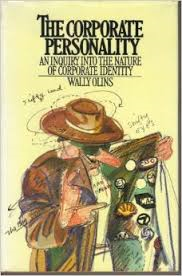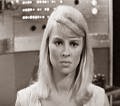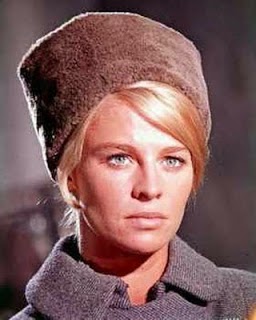What you possibly didn't know about Bob, that he :
* was born outside London in 1942 in the third year of the Second World War in Bury St Edmunds, Suffok and then, from two weeks of age, was brought up in Finsbury Park, London, the son of Elsie, a cook, who instilled him with confidence and who, he later recalled : 'used to say to me, "If somebody doesn't like you, fuck 'em, they've got bad taste." ' and Robert, a clerk with the Pickford Removal Company and communist sympathiser.

 * remembered that : "Our flat was tiny. I had a put-you-up in the front room. We had a bath in the kitchen. The point is you didn't really know anything else; that's how life was. I looked around and all my mates were the same. It was a very skint area."
* remembered that : "Our flat was tiny. I had a put-you-up in the front room. We had a bath in the kitchen. The point is you didn't really know anything else; that's how life was. I looked around and all my mates were the same. It was a very skint area."* was hampered by his poorly understood dyslexia at school in the 1950s, written off as 'stupid' and after leaving at the age of 15 with one 'O' level exam, became a market porter in Covent Garden.
 * said of his youth : "There was a lot of crime, of course, in the Forties and Fifties - robberies, old people getting mugged. There were gangs around Finsbury Park (right) and Haringey. They had knives and coshes and sticks. It was quite violent and it didn't take a lot to get into a fight. You just had to look the wrong way. We were all thugs. If I wasn't an actor I'd probably have been a serial killer or a burglar - something like that".
* said of his youth : "There was a lot of crime, of course, in the Forties and Fifties - robberies, old people getting mugged. There were gangs around Finsbury Park (right) and Haringey. They had knives and coshes and sticks. It was quite violent and it didn't take a lot to get into a fight. You just had to look the wrong way. We were all thugs. If I wasn't an actor I'd probably have been a serial killer or a burglar - something like that".* survived the beatings in street fights, a knife wound across the bridge of his nose which left him with a hollow between the eyes and being taken to meet the Kray Twins who ran London’s underworld in the 1950s.

* later recalled that at the age of 25 in 1967, "trained to be an accountant and thought this is not for me, so I bummed around. I worked on a kibbutz in Israel and travelled the world" and in addition to banana picking on the kibbutz, worked as a camel-herder in Syria and a merchant seaman in the Norwegian Navy.
* later claimed that he “fell sideways into acting by mistake” when, while waiting in a pub with a friend who wanted to audition for the Unity Theatre, was mistaken for the next candidate and recalled : “I was too pissed to argue, so I got on stage and acted my socks off ,” and as a result was offered the lead in 'The Feather Pluckers'.
* said : "I became a professional actor overnight and then I thought, I've got to learn to do this, because people are paying to see me. So I read the experts. I read Stanislavski and that seemed obvious; I read Lee Strasberg and that seemed like looking busy to impress everyone. And I found out that men are completely emotionally crippled - we can't express ourselves - so I started watching women. I became an actor by becoming a stalker."
 * after a year in repertory theatre, building up a reputation as an actor content to do anything, including fire-eating and running headlong at brick walls got his first major tv role was in 'On the Move' at the age of 34 in 1976, an educational series intended to tackle adult illiteracy, in which he played Alf, a removal man who, like him, had problems reading and writing.
* after a year in repertory theatre, building up a reputation as an actor content to do anything, including fire-eating and running headlong at brick walls got his first major tv role was in 'On the Move' at the age of 34 in 1976, an educational series intended to tackle adult illiteracy, in which he played Alf, a removal man who, like him, had problems reading and writing. 
* in the same year, came to wider attention in the original BBC version of Dennis Potter's drama 'Pennies from Heaven' as philandering 1930s sheet music salesman, Arthur Parker, who escapes from his dull life by fantasizing elaborately choreographed musical numbers in which he and the other characters lip-sync to original recording of popular 1930s music.
https://www.youtube.com/watch?v=fcCIVcmqFs8
https://www.youtube.com/watch?v=FVVrZJaN1IU
* was angered by the fact that in the American version of his film his speeches were dubbed into stage Cockney because : “They thought the Yanks wouldn’t be able to understand me. In the film I end up sounding like Dick Van Dyke.”

* won critical and box office acclaim at the National Theatre production of 'Guys and Dolls', where his charismatic performance carried him over any deficiencies in his singing and dancing of which he said : "The choreographer convinced me I looked like Fed Astaire, but really I looked like a little hippopotamus shaking his hooves."

* found critics who described his 'animal appeal' began to compare him to Edward G.Robinson and George Raft and call him the 'Cockney Cagney' and in the 'Mona Lisa' in 1986, won their wider approval with a 'Cannes Award', 'Best Actor Golden Globe', 'Bafta Award' and 'Academy Award Nomination' for Best Actor.
https://www.youtube.com/watch?v=mdEOkAZlV3M
* in 1988 played Eddie Valiant, who investigates a murder involving the famous cartoon character, 'Roger Rabbit'. http://www.youtube.com/watch?v=XAnNvnViJpo and got into his character by studying the way his daughter played with her toys.
* in 2012 had announced his retirement from acting due to his on going battle with Parkinson's disease.
* kept his cockney wit and self-deprecating humour and once said : "I'm just a short fat bald guy who got lucky. Where's the glamour?"
His daughter Rosa has published a moving tribute to her Dad with the 11 lessons he taught her about life :
'My darling Dad has died. I loved him to the ends of the earth and he loved me back just the same. These are the lessons he taught me, I will keep them close to my heart and remind myself of them whenever I stumble or falter.'
Number 11 :
'Love with all your heart. In the end, love is the only thing that matters'.
http://www.mnn.com/lifestyle/responsible-living/stories/11-life-lessons-from-the-late-actor-bob-hoskins-shared-by-his

















.jpg)




.jpg)




















